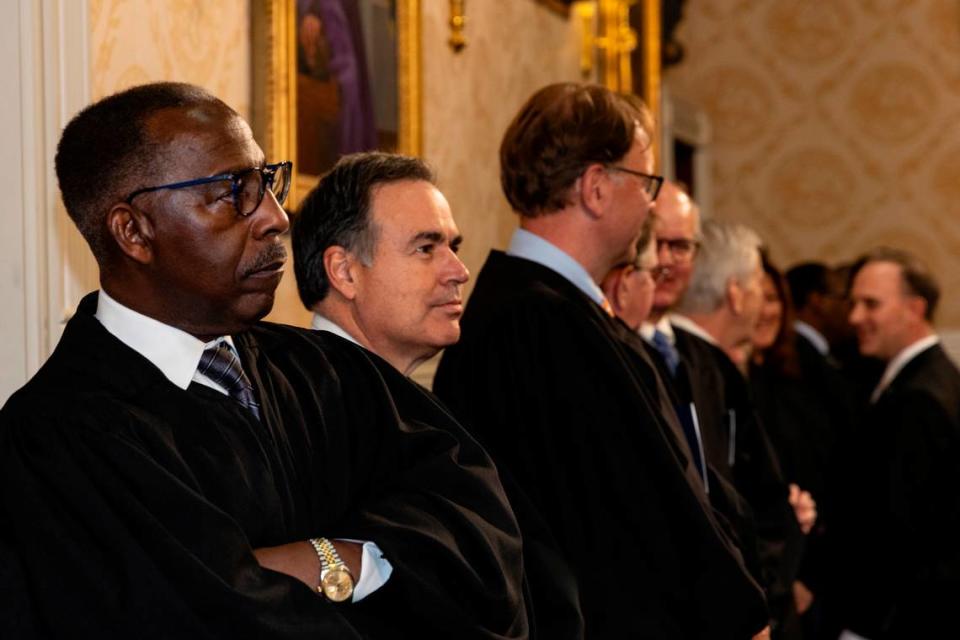Compromise reached on how SC judges are elected. Here are the details of the planned reform
Planned changes to how South Carolina picks judges will allow for more candidates to be considered for a judgeship and give the governor influence over the process.
But the final votes on judges will be done by the full General Assembly and keeps the advantage with House members.
Under a compromise passed Wednesday and headed to the governor’s desk, the Judicial Merit Selection Commission will have term limits for members and have appointees from the governor.
The committee also will be able to nominate more candidates for a judicial position.
However, when lawmakers vote on judicial appointments a candidate only needs to win a majority of the 170 Legislators, a practice that’s currently in place. If the House sticks together or if even all the Republicans in the lower chamber voted together House Republicans can pick the judges.
Elections of judges has come under scrutiny over the perception that lawmakers, many who are lawyers themselves, have undue influence over judges’ decisions. After an initial decision to strike down a six-week abortion law, the governor also called for more transparency in the process.
The Senate pushed to require a candidate to receive a majority of the House and a majority of the Senate, a change that would have allowed the Senate to have more influence over the elections.
Senate Majority Leader Shane Massey, R-Edgefield, said the bill would not have moved if the Senate fought to keep the change in.
“There are so many other good reforms in that process that we weren’t gonna let it die because of that,” Massey said. “I do think, however, that the process that we use is problematic. I mean, in fact, many of the House members will tell you you don’t even need to talk to the senators. The House elects judges, and that’s because of the way that format is. So I don’t like that format, but there are too many other good reforms in that package that I didn’t want to let die because of that.”
South Carolina is one of two states that has its Legislature elect judges.
Other proposed changes on how to move forward in an judge election if no candidate received a majority did not make it into the final compromise.
“Ultimately, we couldn’t reach perfect consensus on that and decided that we would leave existing state law,” said House Judiciary Chairman Weston Newton, R-Beaufort.
When lawmakers vote on judges, they may have more candidates to choose from.
The cap of how many qualified candidates can be nominated by the JMSC will be increased from three to six candidates.
“The JMSC is not going to use that process, because they have four candidates to exclude the best candidate. Could it still happen with six? Yeah, but it’s unlikely when you look at the totality of the races and how many people have historically applied,” Newton said.
The compromise also took out changes to how magistrates are screened.
The makeup of the panel charged with screening candidates also will see changes. Currently the JSMC has 10 members: Five appointed by the House and five appointed by the Senate.
Under the planned changes, four members of the JMSC will be selected by the House: three of whom will be representatives and one member who has to be a member of the bar with at least 10 years of practicing law.
The Senate president would have two appointments, one of whom is a senator and one member who has to be a member of the bar with at least 10 years of practicing law.
The Senate Judiciary chairman would appoint two senators to the JMSC.
The governor would also have four appointments, all of whom have to be members of the bar with at least 10 years of practicing law.
Members of the commission will serve staggered two-year terms and can serve no more than two consecutive terms.
“Hopefully it’ll be a more vibrant and transparent process in the end, I’m not going to call out any names, but I think it’s good to get new people on the commission,” Massey said
Newton said this change means no JMSC member can screen a judge for a second time when they’re seeking reelection.
“No judge is going to be beholden to anybody,” Newton said. “Whether it’s real or perceived, it’s not there. You don’t get to stay long enough to where the judges continue to see you for a generation or have to be good to you.”



